
News
Behind the Headlines
Two-Cents Worth
Video of the Week
News Blurbs
Articles
Testimony
Bible Questions
Internet Articles (2015)
Internet Articles (2014)
Internet
Articles (2013)
Internet Articles (2012)
Internet Articles (2011)
Internet Articles (2010)
Internet Articles
(2009)
Internet Articles (2008)
Internet Articles (2007)
Internet Articles (2006)
Internet Articles (2005)
Internet Articles (2004)
Internet Articles (2003)
Internet Articles (2002)
Internet Articles (2001)

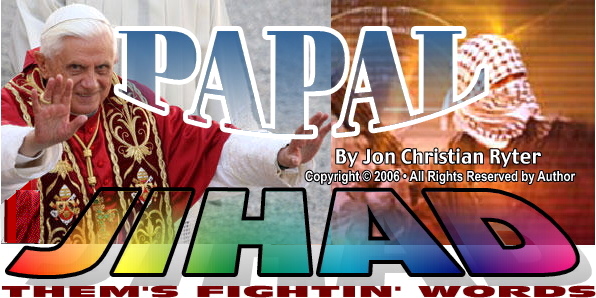
 n
September 12, 2006 German-born Pope Benedict XVI gave an
address at Regensburg University in Bonn entitled "Faith,
Reason and the University: Memories and Reflections."
In 1959 Benedict—then Father Joseph Ratzinger—arrived
at Regensburg as an instructor. In his 2006 speech, Benedict
said that in the face of radical skepticism it is still necessary
and reasonable to raise the question of God through the use of
reason and to do so in the context of the tradition of Christian
faith. He added, "I was reminded of this recently when
I read...a dialogue [that took place] probably in 1391 [AD] in
the winter barracks near Ankara [Turkey] by the erudite Byzantine
Emperor Manuel II Paleologus and an educated Persian on
the subject of Christianity and Islam—and the truth of both.
n
September 12, 2006 German-born Pope Benedict XVI gave an
address at Regensburg University in Bonn entitled "Faith,
Reason and the University: Memories and Reflections."
In 1959 Benedict—then Father Joseph Ratzinger—arrived
at Regensburg as an instructor. In his 2006 speech, Benedict
said that in the face of radical skepticism it is still necessary
and reasonable to raise the question of God through the use of
reason and to do so in the context of the tradition of Christian
faith. He added, "I was reminded of this recently when
I read...a dialogue [that took place] probably in 1391 [AD] in
the winter barracks near Ankara [Turkey] by the erudite Byzantine
Emperor Manuel II Paleologus and an educated Persian on
the subject of Christianity and Islam—and the truth of both.
"In
the seventh conversation," Pope
Benedict continued, "the emperor touches on the theme
of the Holy War. Without descending to details, such as the difference
in treatment accorded to those who have the "Book" and
the "infidels," he addresses his interlocutor with a
startling brusqueness on the central question about the relationship
between religion and violence in general, saying: .jpg) 'Show
me just what Muhammad brought that was new, and there you
will find things only evil and inhuman, such as his command to
spread by the sword the faith he preached.' The emperor,
after having expressed himself so forcefully, goes on to explain
in detail the reasons why the spreading of faith through violence
is something unreasonable. Violence is incompatible with the nature
of God and the nature of the soul. 'God,'
Emperor Manuel said, 'is not
pleased by blood—and not acting reasonably is contrary to
God's nature. Faith is born of the soul, not the body. Whoever
would lead someone to faith needs the ability to speak well and
to reason properly, without violence or threats.'"
'Show
me just what Muhammad brought that was new, and there you
will find things only evil and inhuman, such as his command to
spread by the sword the faith he preached.' The emperor,
after having expressed himself so forcefully, goes on to explain
in detail the reasons why the spreading of faith through violence
is something unreasonable. Violence is incompatible with the nature
of God and the nature of the soul. 'God,'
Emperor Manuel said, 'is not
pleased by blood—and not acting reasonably is contrary to
God's nature. Faith is born of the soul, not the body. Whoever
would lead someone to faith needs the ability to speak well and
to reason properly, without violence or threats.'"
Within two days, Pope Benedict's reiteration of a 615-year old discussion between a Christian emperor and an educated Persian shiekh exploded into an anti-Western, anti-Christian Islamic tirade that threatened to spark the type of violence that ignited the European rioting in January, 2006 over 12 cartoons of the prophet Muhammad that appeared in the Danish newspaper, Jyllands-Posten after the illustrator hired by Kare Bluitgen, the author of the children's book, "The Koran and the Life of the Prophet Muhammad" agreed to produce 10 illustrations for the book only if he was provided anonymity (out of fear of retaliation by Islamic extremists). The Danish newspaper challenged the book publisher's right to self-censorship out of fear of extremists. To show that freedom of the press could not kowtow to fear, Jylland-Posten printed a dozen drawings purported to be Muhammad. One of them depicted what was supposedly the Prophet wearing a turban shaped like a bomb.
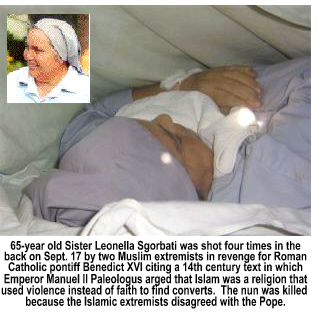 Before
the protest petered out, angry Muslim mobs in Damascus, Syria
and Beirut, Lebanon stormed the Norwegian embassies and set them
ablaze. Muslim extremists throughout Europe rioted in the streets,
torching hundreds of vehicles. Before the fires subsided, eight
people died—over a cartoon caricature. This time around,
two people have already died. On Sept. 17, 2006 two Muslim extremists
in Mogadishu, Somalia shot a 65-year old Catholic nun, Sister
Leonella [Rosa] Sgorbati, four times in the back as she was
entering the Austrian-run women's and children's hospital where
she worked. The killing was to protest the Pope's address at the
university in Bonn. Killed as well was her Somalian bodyguard.
One of the two killers has been apprehended and is in custody.
Somalian authorities assured the Italian government that the search
continues for the other shooter.
Before
the protest petered out, angry Muslim mobs in Damascus, Syria
and Beirut, Lebanon stormed the Norwegian embassies and set them
ablaze. Muslim extremists throughout Europe rioted in the streets,
torching hundreds of vehicles. Before the fires subsided, eight
people died—over a cartoon caricature. This time around,
two people have already died. On Sept. 17, 2006 two Muslim extremists
in Mogadishu, Somalia shot a 65-year old Catholic nun, Sister
Leonella [Rosa] Sgorbati, four times in the back as she was
entering the Austrian-run women's and children's hospital where
she worked. The killing was to protest the Pope's address at the
university in Bonn. Killed as well was her Somalian bodyguard.
One of the two killers has been apprehended and is in custody.
Somalian authorities assured the Italian government that the search
continues for the other shooter.
Memories of the cartoon jihad were still fresh enough in the minds of the Europeans—particularly those in Bonn, Germany—fresh enough that they could envision the streets of Bonn—and Regensburg University—in flames. Out of fear of a Papal Jihad, European leaders began to pressure the Vatican to extend an apology to the Muslim world. A series of apologies—and rejections of those apologies as not enough—occurred over the weekend.
After the shooting of Sister Leonella, Benedict addressed the issue from his summer estate in Castelgandolfo. In his newest apology, the pontiff said he was: "...deeply sorry for the reaction in some countries to a few passages of my address...which were considered offensive to the sensibilities of Muslims. These, in fact, were a quotation from a medieval text which do not in any way reflect my personal thoughts...I hope this will serve to appease hearts and to clarify the true meaning of my address, which in its totality was, and is, an invitation to frank and sincere dialogue, with great mutual respect." And, of course the pundits—both Muslim clerics and media people—weighed in to determine whether or not the pope's "apology" reached a level sufficient to satisfy the injured Muslims.
Turkey's
top Islamic cleric, Ali Bardakoglu, who heads that nation's
powerful Religious Affairs Directorate, issued a stern
statement deploring Benedict's remarks, stating that he
was deeply offended by the Pope's words about an Islamic Holy
War. 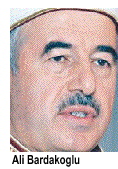 He
termed the pope's speech as "extraordinarily worrying,
saddening and unfortunate," as he demanded that the pontiff
apologize to the Muslim nations of the world. Bardakoglu
insisted that Pope Benedict apologize because, he said,
"...the [medieval] Church and [western society]—because
they saw Islam as the enemy—went on Crusades. They occupied
Istanbul, they killed thousands of people. Orthodox Christians
and Jews were killed and tortured."
He
termed the pope's speech as "extraordinarily worrying,
saddening and unfortunate," as he demanded that the pontiff
apologize to the Muslim nations of the world. Bardakoglu
insisted that Pope Benedict apologize because, he said,
"...the [medieval] Church and [western society]—because
they saw Islam as the enemy—went on Crusades. They occupied
Istanbul, they killed thousands of people. Orthodox Christians
and Jews were killed and tortured."
George Weigel, an author who has written extensively on the papacy, said he felt the pope had expressed a sufficient level of regret over the way his words were twisted and manipulated, adding that it was good that the pope did not back down. "The over-the-top reaction in the Muslim world," he noted, "simply underscores the truth of what he said at Regensburg, which is that unless Islam develops the capacity to be self-critical—unless the Islamic leaders take responsibility for saying to their extremists that violence in the name of God is wrong—then there can be no genuine inter-religious dialogue. There has not been the slightest backing off of that. And, there can't be because it's true."
Bardakoglu's
statement suggested that the Christians and Jews were killed by
the Crusaders. The Byzantines, who were Macedonians, occupied
Turkey from as early as 527 AD—some 43 years before the birth
of Muhammad. 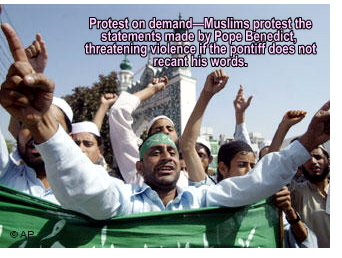 The
first emperor of the Byzantines was Justin. His son, Justinian—and
his general, Belisarius—led the first attack against
Persia. Belisarius was defeated by the Syrians at Callinicum
in 532 AD. A year later he conquered North Africa. Justinian
conquered Rome four years later. The Byzantines massacred Christians,
Jews and Muslims alike—just as the Persians did between 611-622
AD, when they invaded Antioch, Damascus and Jerusalem, and then
Chalcedon and Egypt. Like the Byzantines, the Persians and the
Syrians also indiscriminately killed the occupants of those land
without regard of ethnicentricity. Until the birth of Islam, religion
wasn't that important—unless, of course, you were a Jew.
The
first emperor of the Byzantines was Justin. His son, Justinian—and
his general, Belisarius—led the first attack against
Persia. Belisarius was defeated by the Syrians at Callinicum
in 532 AD. A year later he conquered North Africa. Justinian
conquered Rome four years later. The Byzantines massacred Christians,
Jews and Muslims alike—just as the Persians did between 611-622
AD, when they invaded Antioch, Damascus and Jerusalem, and then
Chalcedon and Egypt. Like the Byzantines, the Persians and the
Syrians also indiscriminately killed the occupants of those land
without regard of ethnicentricity. Until the birth of Islam, religion
wasn't that important—unless, of course, you were a Jew.
The Muslim world began to expand, first consuming Syria and Mesopotamia, then fanning out through Eurasia and Northern Africa. The Muslims conquered Spain in 715 AD, laid seige to Constantiople in 716 AD, crossed the Pyrennes and invaded France in 732 AD. While expansion was slow and difficult, the Muslim Empire under the Caliphates continued to expand northward into Europe. In 827 AD, the Muslims conquered Sicily and began raiding settlements in southern Italy. When the Muslims threatened Rome in 961 AD, Pope John XII brought the armies of Otto the Great to Rome. In 1095 AD at the Synod of Clermont, Pope Urban II (head of the Latin Church) received a plea from Byzantine Emperor (the Greek Church) for help against the Muslim Turks. This led to the first Crusade in 1099 AD. The purpose of the Crusades was to stop the spread of Islam by the sword. Between 1099 and 1456, the Latin and Greek Churches orchestrated nine Crusades against the Muslim world. Thousands of Christians, Muslims and Jews died at the hands of both Christian and Muslim warriors. The Muslims believe Allah commanded them to spread Islam—by the sword if necessary—to all of the world. Those who refuse to convert to Islam during those battles were killed. Once the wars were settled, non-Islamics were allowed to settle in the Muslims lands, but they were always treated like second-rate citizens with fewer privileges than Muslims.
Pope Benedict issued his first "apology" in answer to the demand by Bardakoglu and other prominent Muslims around the world. But Benedict's apology wasn't satisfactory because the pope did not admit wrongdoing, nor did he take the blame for a statement made by a long dead emperor. The pope merely stated he regretted that his reiteration of the dialogue between Emperor Manuel II and the Persian shiekh offended the Muslim world. He refused to say he was wrong or that the views he expressed were inappropriate. His apology merely increased the outrage in the Muslim world, and led to the killing of Sister Leonella Sgorbati—once again, proving Benedict's point concerning the extremes of Islam.
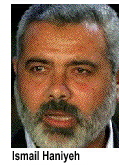 Following
a demand by Palestinian Prime Minister Ismail Haniyeh for
the pope to apologize, Palestinian Muslims fire-bombed five West
Bank and Gaza Christian Churches on Sept. 16. Two of the churches
that were fire-bombed with Molotov cocktails were Roman Catholic.
Two were Greek Orthodox. The fifth, in Nablus, was Anglican. Four
of the churches were in the West Bank and the fifth, one of the
Greek Orthodox churches, was in Gaza.
Following
a demand by Palestinian Prime Minister Ismail Haniyeh for
the pope to apologize, Palestinian Muslims fire-bombed five West
Bank and Gaza Christian Churches on Sept. 16. Two of the churches
that were fire-bombed with Molotov cocktails were Roman Catholic.
Two were Greek Orthodox. The fifth, in Nablus, was Anglican. Four
of the churches were in the West Bank and the fifth, one of the
Greek Orthodox churches, was in Gaza.
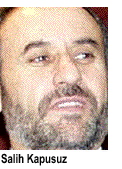 Salih
Kapusuz, deputy to Turkey's Prime Minister Recep Tayyip
Erdogan, said the pope's remarks were either "...the
result of pitiful ignorance" about Islam and its Prophet
or, worse, a deliberate distortion. "He has a dark mentality,"
Kapusuz said, "that comes from the Middle Ages.
[His remarks look] like an effort to revive the mentality of the
Crusades." Iranian Foreign Ministry spokesman Mohammad
Ali Hosseini said Pope Benedict made a big mistake,
and "...contradicted his own leadership of a divine religion."
When the Vatican offered an apology to the world's Muslim population
on behalf of the pope, Lebanon's senior Shi'ite cleric, Grand
Ayatollah Mohammed Hussein Fadlallah, told worshippers
in Beirut that the Muslim world "...[does not] accept
the apology through Vatican channels."
Salih
Kapusuz, deputy to Turkey's Prime Minister Recep Tayyip
Erdogan, said the pope's remarks were either "...the
result of pitiful ignorance" about Islam and its Prophet
or, worse, a deliberate distortion. "He has a dark mentality,"
Kapusuz said, "that comes from the Middle Ages.
[His remarks look] like an effort to revive the mentality of the
Crusades." Iranian Foreign Ministry spokesman Mohammad
Ali Hosseini said Pope Benedict made a big mistake,
and "...contradicted his own leadership of a divine religion."
When the Vatican offered an apology to the world's Muslim population
on behalf of the pope, Lebanon's senior Shi'ite cleric, Grand
Ayatollah Mohammed Hussein Fadlallah, told worshippers
in Beirut that the Muslim world "...[does not] accept
the apology through Vatican channels." 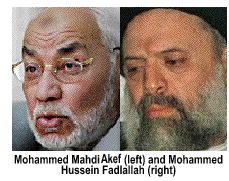 Fadallah
added that the Muslim community asks "...[Pope Benedict]
to offer a personal apology—not through his officials."
Over the weekend, when the Vatican once again proffered an apology
from the pope, Mohammed Bishr, a senior member of the Egyptian
Muslim Brotherhood, reiterated that "...[w]e
will not accept others to apologize on his behalf."
Fadallah
added that the Muslim community asks "...[Pope Benedict]
to offer a personal apology—not through his officials."
Over the weekend, when the Vatican once again proffered an apology
from the pope, Mohammed Bishr, a senior member of the Egyptian
Muslim Brotherhood, reiterated that "...[w]e
will not accept others to apologize on his behalf."
England's Muslim community—which now has a respectful fear of the British government—quickly accepted the pontiff's apology and argued for calm. "We praise [the pope's] apology," said Muhammad Umar, chairman of England's Ramadhan Foundation, "and we hope we can work together to build bridges. At the same time, we would condemn all forms of violent demonstration." But Muhammad Abdul Bari, general-secretary of the Muslim Council of Britain, insisted that the pope repudiate the views he quoted in order to restore relations with the Muslim community.
Malyasian Prime Minister Abdullah Admad Badawi—the same man who President George W. Bush commended for his democratic principles on Monday—condemned the pope last Friday, demanding that Benedict retract his remarks and not "...take lightly the spread of outrage that has been created." Forcing the pontiff to recant or retract his words is tantamount to a denial of the truth of the words. The Muslims know that. So does the Vatican. Bush commented that Pope Benedict made some apologies for his remarks. Bush said the pope was sincere, suggesting by his comment that the Muslim world should drop the issue. But, why would they? It is a rallying cry for Jihad around the world when al Qaeda desperately needed recruits in Iraq and Afghanistan.
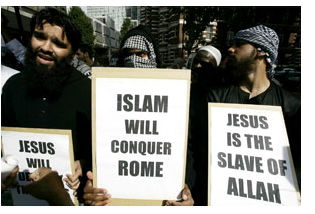 When
the flack started, the first statement was issued by Vatican spokesman
Federico Lombardi who said that "...[i]t is clear
that the Holy Father's intention is to cultivate a position of
respect and dialogue towards other religions and cultures, and
that clearly includes Islam." The pontiff, who uttered
a statement of fact to support the view that Islam converts by
the sword and not by faith, was upset by the manner in which his
remarks were interpreted by the Muslim world as 150 demonstrators
in Basra, Iraq burned an effigy of Pope Benedict. Another
hundred-or-so demonstrators protested outside the Vatican embassy
in Jakarta, Indonesia, 150 more demonstrated at an Islamic shrine
in Damascus and Egypt expelled the Vatican envoy.
When
the flack started, the first statement was issued by Vatican spokesman
Federico Lombardi who said that "...[i]t is clear
that the Holy Father's intention is to cultivate a position of
respect and dialogue towards other religions and cultures, and
that clearly includes Islam." The pontiff, who uttered
a statement of fact to support the view that Islam converts by
the sword and not by faith, was upset by the manner in which his
remarks were interpreted by the Muslim world as 150 demonstrators
in Basra, Iraq burned an effigy of Pope Benedict. Another
hundred-or-so demonstrators protested outside the Vatican embassy
in Jakarta, Indonesia, 150 more demonstrated at an Islamic shrine
in Damascus and Egypt expelled the Vatican envoy.
In their
rage, the al Qaeda-backed Mujahideen Shura Council—hoping
to entice new terrorists to join the jihad—is actually reenforcing
what Pope Benedict said. "We tell the worshippers
of the cross that you and the West will be defeated as in the
case of Iraq, Afghanistan and Chechnya." They have resolutely
made the pope's case. "You infidels and despots, we will
continue our jihad and never stop until God avails us to chop
your necks and raise the fluttering banner of monotheism, when
God's rule is established governing all people and nations."
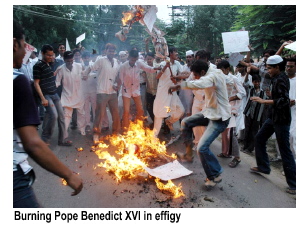 By
vowing to fight Christianity and threatening to spill Christian
blood until Islam conquers the world, al Qaeda has confirmed
that Islam converts with the sword. In a prepared statement
that was published on the Internet, the al Qaeda mujahedeen consultive
council in Iraq said it "...will engage in Jihad until the
west is won over...We say to [Pope Benedict] the servant
of the cross: wait for defeat...We say to the infidels and tyrants:
wait for what will afflict you. We continue our [holy war]. We
will not stop until the banner of [Islam] flies throughout the
world. We will smash the cross...You will have no choice but Islam
or death." Two other terrorist groups: Jaish al-Mujahedeen
(the Mujahedeen's Army) and Asaeb al-Iraq al-Jihadiya
(League of Jihadists in Iraq) also published responses
that made it clear the extremists would carry jihad to the world
as Islamic extremists began demanding and Islamic army march on
Rome and execute Pope Benedict.
By
vowing to fight Christianity and threatening to spill Christian
blood until Islam conquers the world, al Qaeda has confirmed
that Islam converts with the sword. In a prepared statement
that was published on the Internet, the al Qaeda mujahedeen consultive
council in Iraq said it "...will engage in Jihad until the
west is won over...We say to [Pope Benedict] the servant
of the cross: wait for defeat...We say to the infidels and tyrants:
wait for what will afflict you. We continue our [holy war]. We
will not stop until the banner of [Islam] flies throughout the
world. We will smash the cross...You will have no choice but Islam
or death." Two other terrorist groups: Jaish al-Mujahedeen
(the Mujahedeen's Army) and Asaeb al-Iraq al-Jihadiya
(League of Jihadists in Iraq) also published responses
that made it clear the extremists would carry jihad to the world
as Islamic extremists began demanding and Islamic army march on
Rome and execute Pope Benedict.
Around
the world police agencies greatly increased security around both
Protestant and Catholic churches. In London, police launched an
investigation into remarks made by Anjem Choudhary, deputy
to Kamran Bokhari, the spokesman for the British Muslim
extremist group, Al Muhajiroun. Bokhari was
invited by the Muslim Student Association at Southwest Missouri
State University to address the student body. The university
picked up tab for Bokhari—who declared that Osama
Bin Laden was a 'scapegoat' for the United States. 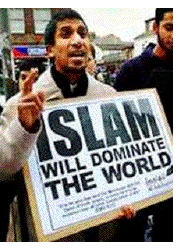 He
also referred to the American Founding Fathers as 'terrorists.'
in order to give Muslim terrorists credibility in the eyes of
Americans who can't tell the difference between a citizen army
fighting the army of a another nation and terrorists waging war
on unarmed women and children. Choudary who held a demonstration
of Muslim outside Westminster Cathedral on Sunday in which he
inflamed the crowd as he demanded the execution of Pope Benedict.
The 39-year old English citizen is a lawyer who organized a trouble-sparked
protest in February over the Danish cartoons of Muhammad. The
placards carried during that demonstration said: "Behead
Those Who Insult Islam." "Non-Muslims,"
Choudhary told the London Daily Mail, "must...understand
that there may be serious consequences if you insult Islam—and
the Prophet. Whoever insults the message of Muhammad is going
to be subject to capital punishment."
He
also referred to the American Founding Fathers as 'terrorists.'
in order to give Muslim terrorists credibility in the eyes of
Americans who can't tell the difference between a citizen army
fighting the army of a another nation and terrorists waging war
on unarmed women and children. Choudary who held a demonstration
of Muslim outside Westminster Cathedral on Sunday in which he
inflamed the crowd as he demanded the execution of Pope Benedict.
The 39-year old English citizen is a lawyer who organized a trouble-sparked
protest in February over the Danish cartoons of Muhammad. The
placards carried during that demonstration said: "Behead
Those Who Insult Islam." "Non-Muslims,"
Choudhary told the London Daily Mail, "must...understand
that there may be serious consequences if you insult Islam—and
the Prophet. Whoever insults the message of Muhammad is going
to be subject to capital punishment."
The extremist group Ansar al-Sunna in Iraq issued a statement on Monday decrying the pathetic advocacy of the Muslim world by challenging "sleeping Muslims" to prove their manhood by doing something more than just making statements or holding demonstrations. "If the stupid pig is prancing with his blasphemies in his house, then let him wait for the day coming soon when the armies of the religion of right knocks on the walls of Rome." Although it has been hard for the radicals to whip up the fervor they were able to generate during the Danish Muhammad cartoon flap, the extremists were nevertheless successful in convincing the Muslim world—and the European media—that Pope Benedict's comments prove that the West is waging a war against Islam. In speaking before the UN, Bush told the assembled dignitaries that the United States is not waging war against Islam. The US is, the president reiterated, waging a war against terrorists who have waged war against America. Of course, as the Muslim world knows, it's the same thing. America just hasn't figured that one out yet because they prefer to believe that Islam is not a religion of hate, and Islam is not bent on world domination, using, as Pope Benedict pointed out, the sword instead of faith as its primary instrument of conversion.
Yet, the Pope was not implying in his remarks that Islam is wholly violent or that the subjugation of the world's population is their core objective—although, by the statements of the Wahabbi extremists, we know it is the core objective of radical Islam. However, while the Christian Old Testament instructed the Hebrews leaving Egypt to conquer the lands that God bequeathed them and, in Joshua, I and II Chronicles, I and II Kings and Esther, to kill those who would otherwise harm or defile the Jews, there are no universal instructions in the Christian Bible or the Torah such as those found in the Qur'an that mandate the conversion of the unbelievers by the sword—or the subjugation of the conquered peoples as an inferior class of people.
The Wahabbists within the Muslim world will use any offense—regardless how slight—as an excuse to declare Jihad against the nonbeliever. There appears to be a perpetual chip on the Islamic shoulder that leads to bloodshed whenever it is is dislodged—such as being struck by a light breeze on a balmy afternoon. That may be what led Egyptian Coptic Pope Shenouda III to say: "Any remark which offends Islam and Muslims are against the teachings of Christ." That statement, of course, is not true, since Christ repeatedly told His followers that He was the Way, the Truth and the Light; and that no one would go to the Father except through Him. And, quite frankly, to a Muslim—them's fightin' words.

Copyright © 2009 Jon Christian Ryter.
All rights reserved.


